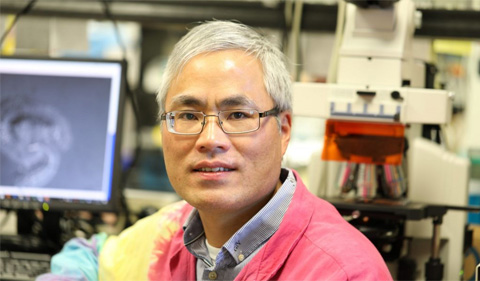Proteins are nanoparticle machines in cells involved in thousands of metabolic pathways. The precise management of their functions is critical to the survival or healthy status of a cell. One essential management is to determine when and what proteins should be removed at different growth and developmental stages of a cell.
This is the big question that Dr. Zhihua Hua’s lab is aiming to address.
In a recent publication, Generation of a fertile ask1 mutant uncovers a comprehensive set of SCF-mediated intracellular functions, Hua lab researchers have shed new light on a broad spectrum of intracellular functions involving protein degradation management.
This management is mediated by a specific group of proteins, called Skp1-Cul1-F-box (SCF) ubiquitin ligase complexes. The Hua lab utilizes a model plant, Arabidopsis, to study the managing role of this group of protein complexes.
The researchers of this paper cleverly took the bridging function of Skp1 in the complex and disrupted its function in different Arabidopsis accessions.
“I was so excited when we discovered different outcomes of the same mutation of ASK1 in Ler and Col-0, two different accessions of Arabidopsis,” said Hua, Associate Professor of Environmental & Plant Biology at Ohio University. ASK1 is the Arabidopsis version of Skp1. The research group applied a transposon Ds insertion mutation in the ASK1 gene and studied the phenotypic changes in Ler and Col-0. While the same mutation resulted in a male sterile phenotype in Ler, it only reduced fertility in Col-0.
This discovery allowed the researchers to get progenies of the mutant, thus giving them more options to study the functions of the SCF ubiquitin ligase complexes.
“It was a really high rewarding research and learning experience working with Dr. Hua on this project,” the first author, said Madhura Yapa, a first-year Ph.D. student in Hua’s lab. However, he joined this project with Hua two years ago when he began to learn molecular biology with Hua.
“With his patience and collaborative learning skills, Madhura has overcome many challenging experimental difficulties in this project. I really appreciate Madhura’s excellent work in this project,” Hua commented.
The paper is funded by Hua’s NSF-CAREER award and published in The Plant Journal, a leading journal in plant science. Also contributing to the work were Peifeng Yu (third year Ph.D. student), Dr. Fanglei Liao (previous visiting scientist), and Abigail G. Moore (previous PACE undergraduate researcher).




















Comments